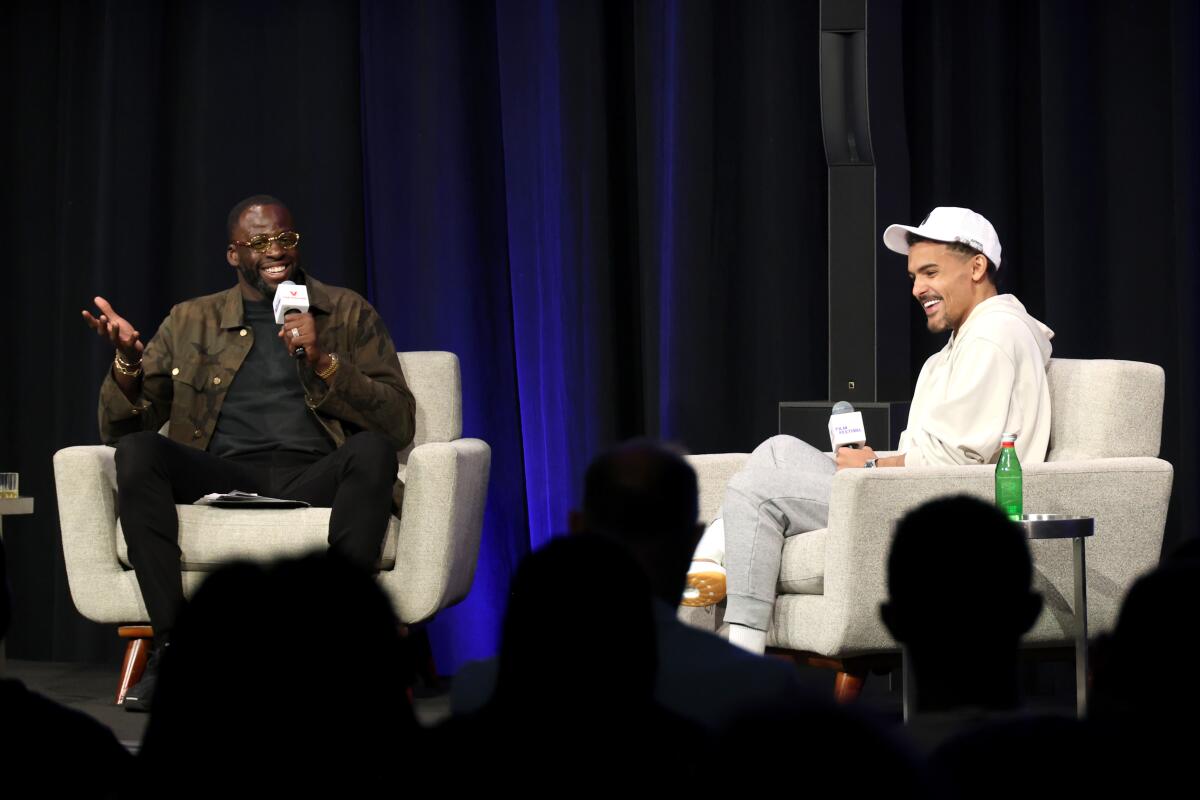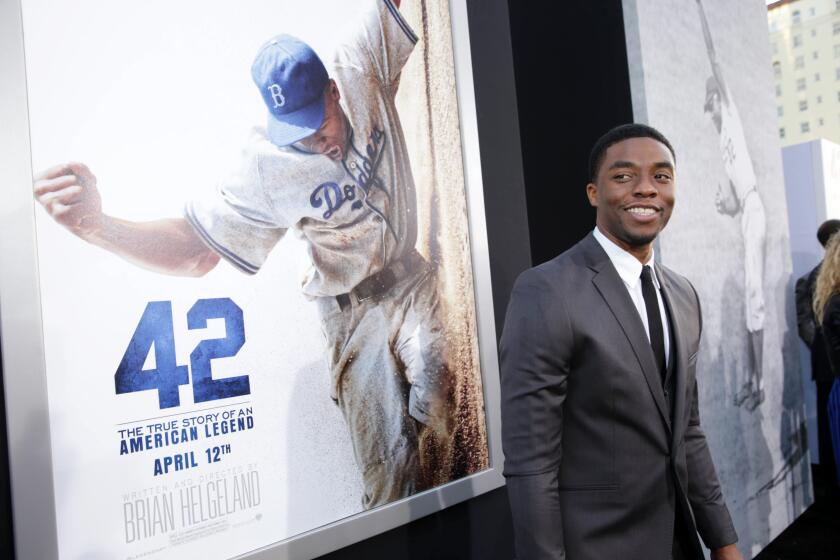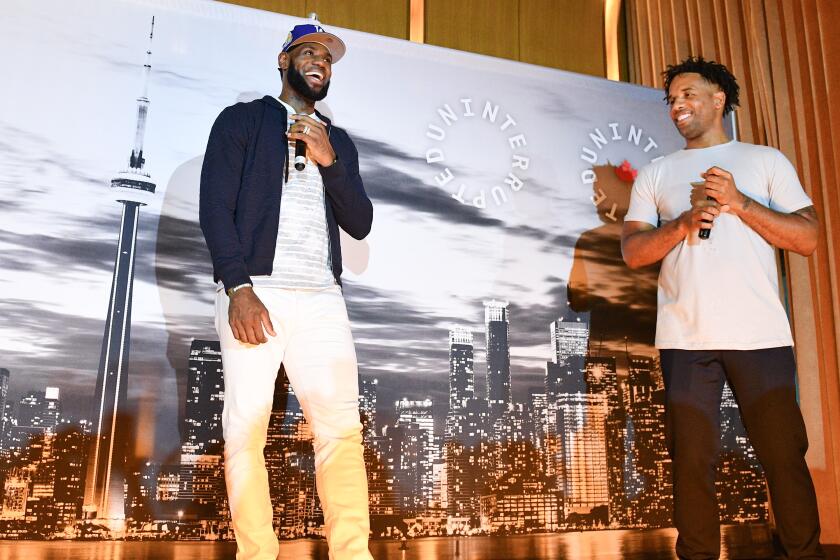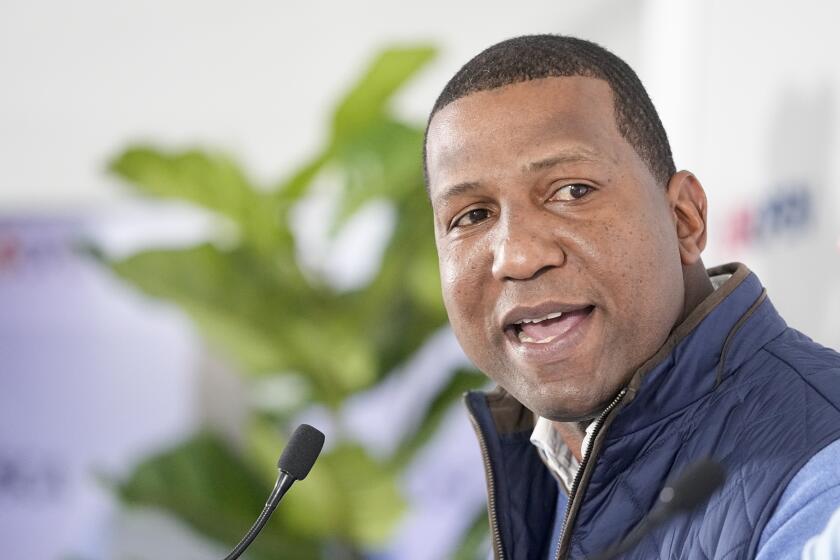Commentary: ‘Ali is our hero.’ Uninterrupted festival highlights athletes telling their stories

Decades after heavyweight boxing champion Jack Johnson’s quest for self-determination as a Black man in America led to his downfall, Muhammad Ali sought control of his own story.
Ali, with help from football star Jim Brown and others, most notably the Nation of Islam, in 1966 created Main Bout Inc. to manage promotion of his championship fights. For reasons involving race, economics, politics, patriotism and religion, the company soon failed.
I thought of Ali and Main Bout often while at the Uninterrupted Film Festival last week at NeueHouse Hollywood. LeBron James’ SpringHill Co. and Tribeca Enterprises used the event to spotlight athletes who are also succeeding as filmmakers, content creators and social justice advocates.
James and Maverick Carter co-founded Uninterrupted as a brand in 2014 amid what’s considered the recent player empowerment movement. From Ali in the ’60s to baseball free-agency vanguard Curt Flood in the ’70s, to basketball and marketing icon Michael Jordan in the ’80s and ’90s, to the first athletes to exploit social media for their own means — they all spurred athletes today to not only tell their own stories, but also create ways to tell others’ stories.
These films show us what happens when sports and race also intersect with criminal justice, education, integration, militarism, patriotism, politics, religion, social class, etc.
Uninterrupted definitely takes inspiration from Main Bout, Carter told me at the festival.
“Ali is our hero,” he said. “He’s the god of athlete storytelling, and he did it with wit, with seriousness. He did it about [important] subjects, but also just to make people laugh and engage.”
Carter said Ali’s storytelling embodied what Uninterrupted wants in its new projects: authenticity, entertainment and insight. Two films showcased at the festival offered all of that.
The first was “Goliath,” a new Showtime docu-series about Wilt Chamberlain, the trailblazing NBA champion and basketball hall of famer. Content Cartel, the L.A.-based company owned by Kevin Garnett, another NBA all-timer, is among the film studios that produced the series.
“Goliath” left me eager to add Chamberlain as a focal point of the race, sports and culture course I teach every semester. As a reporter for the Philadelphia Inquirer in 1999, I interviewed people in his old West Philadelphia neighborhood for reaction on the day Chamberlain died. I recall focusing on his athletic prowess and fame. Not as much it seems on his groundbreaking role in showing white America that Black men should determine their own fate.
“He was not going to be handled, and in the ’50s and ’60s some people didn’t like that, you know — they wanted you to be in your place,” Lakers Hall of Famer James Worthy said. “And Wilt was like, ‘I’ll show you what my place is.’ And that’s why we all loved him and respected him, and we learned from that.”
The next discussion had Joel Embiid, the reigning NBA MVP, joining Carter on stage to introduce Miniature Géant, the film company Embiid created with help from SpringHill. Among the athlete’s first projects is “Green Lions,” about the 1990 soccer team from his native Cameroon — and the first from Africa to reach the quarterfinals of a FIFA World Cup.
The Uninterrupted Film Festival, backed by LeBron James and Maverick Carter, will focus on empowering athletes to tell their stories.
Embiid said of his company’s ambitions, “We want to find unique things that can captivate people’s minds, and so they can learn from it, and they can get inspired.”
The festival’s other primary screening was “Black Ice,” a documentary opening in U.S. theaters this weekend, with James and Carter among its executive producers.
“Black Ice” explores the history of racism in hockey — primarily in Canada, but also in America — through the stories of Black players, both past and present, in the predominately white sport.
The film, though, is much more than a sports story. It’s about what it means to be a person of color in North America. And what it means to get a nation to even talk about such a thing.
“To be honest with you guys, the last, I would say 25 years, producers have been trying to tell this story in Canada, but it just could never get greenlit,” Vinay Virmani, one of the “Black Ice” producers, said while moderating a panel discussion. “Networks, studios, they just kept calling it, ‘Oh, you know, nobody cares about Black hockey history.’”
Virmani thanked Akim Aliu, a former NHL player who in 2019 stated publicly that Bill Peters, then coach of the Calgary Flames, had years earlier directed racial epithets at him in a minor league locker room. Peters resigned soon afterward.
“Little by little, things got a lot better,” Aliu said when asked what he will tell his son if he someday wants to play hockey. “Now we’re sitting on this stage and able to talk about these conversations in the open, but it definitely wasn’t like that three, three and a half years ago.”
More than 800 people attended the festival, according to organizers.
Fred Perpall, the first Black USGA president, says the key to improving golf’s diversity is unlocking access to play at all levels.
Some looked on as Kayvon Thibodeaux, the former local prep school star and current New York Giants linebacker, moderated a panel about how name, image and likeness revenue is empowering next-generation athletes and their storytelling. The lineup included USC quarterback Malachi Nelson, defensive back Ceyair Wright and point guard Juju Watkins.
The festival began with pro softball player A.J. Andrews, Olympic hurdler and bobsledder Lolo Jones, and Angel McCoughtry, the former WNBA star and Olympic gold medalist, discussing how and why they still create content to stay relevant and marketable.
“As I became an older athlete, a girl stopped getting these contracts; they were like going to the younger athletes,” Jones said. “But what kept me in the game was my storytelling ability on social media, and getting those Instagram ads.”
The festival ended with a live taping of “The Draymond Green Show.” The Warriors forward interviewed Trae Young, the Hawks’ point guard.
One imagines Ali crushing it as a podcast host. Yes, some would prefer he just bob and weave. What’s nice is that while he, Chamberlain, Brown and Bill Russell were among the few Black athletes able to lift their voices in the ’60s, today we have many more with vast fortunes and a readiness to help tell important stories that otherwise would not be told.
Lowe is a Times visiting academic fellow and senior lecturer at the University of Florida College of Journalism and Communications.













